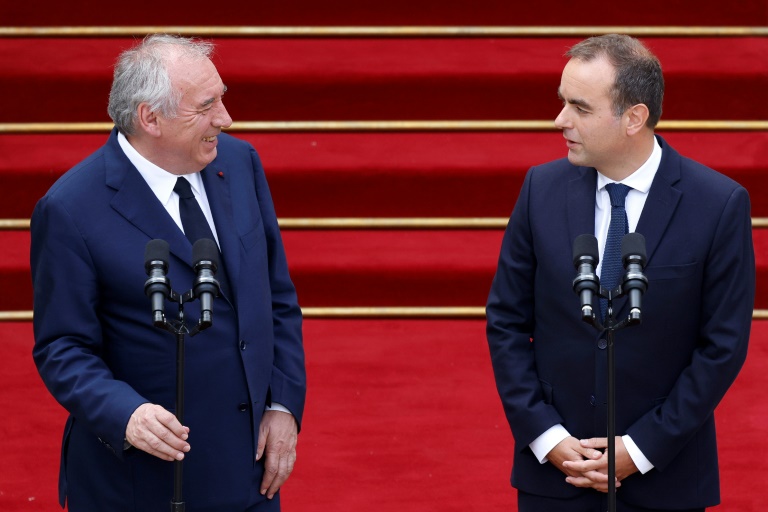All change: France’s outgoing prime minister Francois Bayrou, next to France’s newly-appointed Prime Minister Sebastien Lecornu (Ian LANGSDON)
The European Central Bank held interest rates steady again Thursday with inflation under control and trade tensions having eased, even as France’s political crisis presents policymakers with a fresh challenge.
The central bank for the 20 countries that use the euro left its key deposit rate at two percent, as widely expected, with inflation hovering close to its two-percent target.
The turmoil unleashed by US President Donald Trump’s tariffs blitz has also subsided since the European Union and the United States struck a deal in July, setting levies on most EU goods at 15 percent.
Announcing its decision, the ECB noted that inflation was currently around target, and “the governing council’s assessment of the inflation outlook is broadly unchanged”.
As expected, the bank offered no indication of its next move, saying that it was “not pre-committing to a particular rate path” and would “follow a data-dependent and meeting-by-meeting approach”.
In updated projections, the ECB increased its forecast for eurozone growth in 2025 to 1.2 percent but lowered it slightly for 2026 to 1.0 percent.
It also hiked its inflation forecasts slightly for both this year and next.
At the press conference following the rate call, ECB President Christine Lagarde is likely to face questions on the escalating crisis in France, the eurozone’s second-biggest economy.
Francois Bayrou quit as prime minister on Monday following his defeat in a confidence vote over an austerity budget, and was replaced just 24 hours later by Sebastien Lecornu — France’s third prime minister within a year.
The turmoil sent France’s borrowing costs, a measure of investor confidence, surging above those of traditional eurozone debt laggard Italy.
Lagarde, who was French finance minister from 2007 to 2011, is likely to reiterate that she does not comment on individual eurozone member states although she might make a general call for fiscal discipline.
– French, German woes –
One key question she could be pressed on is whether the ECB is weighing the use of a special mechanism aimed at calming disorderly movements in bond markets.
This tool, known as the Transmission Protection Instrument (TPI), involves the ECB buying bonds of a eurozone country that is struggling to raise finances due to unjustified market attacks — although not if a country is struggling due to weak fiscal discipline.
Established in 2022 during a period of instability in Italy, it has never been used.
In a nod to this, the ECB noted in its statement that the mechanism “is available to counter unwarranted, disorderly market dynamics that pose a serious threat to the transmission of monetary policy across all euro area countries”.
Story Continues
